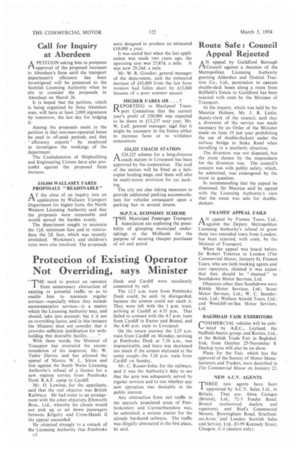Protection of Existing Operator Not Overriding, says Minister
Page 40

If you've noticed an error in this article please click here to report it so we can fix it.
" THE need to protect an operator from unnecessary abstraction of existing or potential traffic so as to enable him to maintain regular services—especially where they include unremunerative services—is a matter which the Licensing Authority may, and should, take into account; but it is not an overriding factor, and in this instance the Minister does not consider that it provides sufficient justification for with
holding this desirable facility. . ."
With these words, the Minister of Transport has overruled the recommendation of his inspector, Mr. W. Tudor Davies, and has allowed the appeal of Messrs. W. L. Silcox and Son against the South Wales Licensing Authority's refusal of a licence for a new express service from Pembroke Dock R.A.F. camp to Cardiff.
Mr. O. Lowless, for the appellants, said that the real objector was British Railways. He had come to an arrangement with the other objectors, Ehsworth Bros., Ltd., whereby his clients would not pick up or set down passengers between Kilgetty and Cross-Hands if the appeal succeeded.
He objected strongly to a remark of the Licensing Authority that Pembroke c2 Dock and Cardiff were excellently connected by rail.
The 12.5 a.m. train from Pembroke Dock could, he said, be disregarded, because the airmen could not catch it. They were left with the 1 p.m. train, arriving at Cardiff at 4.55 p.m. That' failed to connect with the 4.5 p.m. train from Cardiff to Exeter and Bristol, and the 4.40 p.m. train to Liverpool.
On the return journey the 2.25 a.m, train from Cardiff on Monday, arriving at Pembroke Dock at 7.10 a.m., was impracticable, and leave was shortened too much if the airmen stationed at the camp caught the 5.26 p.m. train from Cardiff on Sunday.
Mr. C. Rosser-John, for the railways, said it was the Authority's duty to see that the area was adequately served by regular services and to test whether any new operation was desirable in the public interest.
Any abstraction from rail traffic in the sparsely populated areas of Pembrokeshire and Carmarthenshire was, he submitted, a serious matter for the already burdened railways. The traffic was illegally abstracted in the first place, he said.




































































































